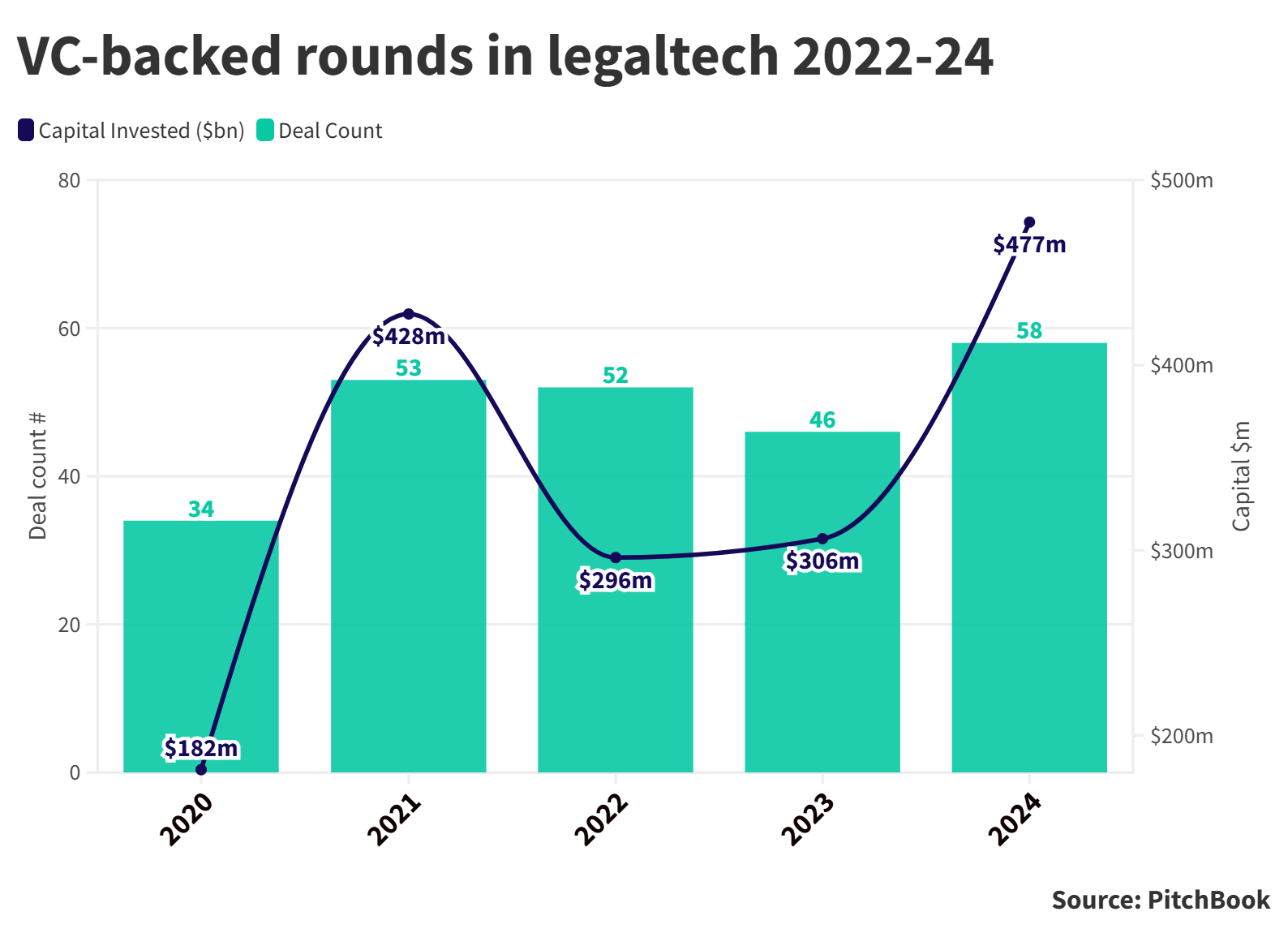Funding for legal tech has exploded in the wake of ChatGPT, and startups – and law firms – that don’t use artificial intelligence are going to be left behind.

Legal tech has been a major beneficiary of the artificial intelligence startup boom that began last year, driving investment in legal tech startups to a record high in 2024.
Investors say AI-powered legal technology has the potential to significantly change the way law firms work and bill, especially as the technology moves from simply automating back-office functions to actual provision of legal services.
“The rush we saw in the first six to 12 months was around drafting contracts and using AI to do things like negotiations and review (correcting documents) back and forth,” says Shubham Datta, who heads the corporate venture capital arm of legal software producer Clio. .
“What I’m really interested in and what I’m really interested in are things that actually change the workflow, or help automate some of the workflows that lawyers have, and use AI to power them. »
The public unveiling of ChatGPT has dramatically expanded expectations for what AI can do, and while significant sums have been invested in OpenAI competitors like Anthropic or Cohere, it has also precipitated investment in areas like the law. The number of legal tech startups raising funds had reached a new annual high at the end of October this year, as had the cumulative amount raised.

About a third of information and technology services provider Thomson Reuters’ business spans the legal sector, generating billions of dollars in revenue annually, and its CVC unit is among investors actively exploring the use of AI in the sector.
“For us, being able to apply models and AI to our content really sets us apart,” says Tamara Steffens, managing director at Thomson Reuters Ventures. “The timing is perfect for us.”
Thomson Reuters Ventures’ portfolio includes Wisedocs, the creator of a tool that uses AI to summarize medical records in injury claims, as well as Spellbook, which applies the technology to contract review and drafting. Another investment concerns Priori, an online marketplace for legal professionals. The main product was launched in 2011, but has now added an AI tool called Scout to automate law firm panel management and interaction with external lawyers.
“Spellbook is probably the leading legal writing tool on the market, and I would now say it’s one of the best paralegals to go along with that,” Steffens says.
“Priori also uses AI in a number of different areas. Priori provides the tool to legal advisors and corporate lawyers, and if you are a large technology company and you need a specialist lawyer who knows something about, say, the Louisiana Port, then you can find a lawyer who understands this.
Legal technology has also taken a leap forward because, while very large language models work well for a wide variety of creative tasks like creating text or images, they are not effective in a field like law , which relies on highly specialized knowledge and has no tolerance for the law. the errors or “hallucinations” to which generative AI is prone. This has created space for specialized startups, even in specific types of law, able to work with precise information and frames of reference.
“Some horizontal solutions like Chat GPT are not a good use case for legal”
Shubham Datta, Clio Ventures
“It makes perfect sense to start in particular practice areas, where you fully appreciate and understand the nuances of a particular practice area. This is why some horizontal solutions like Chat GPT are not a great legal use case,” says Datta.
“One of the problems with these broader models is that they try to do so many things that when you start looking at them for very specific tasks, down to figuring out what form you might need to file an application for. ‘immigration for a very nuanced period, it may hallucinate or have difficulty with this use case, because it takes into account many different parameters that may not be relevant.
“Whereas if you have a specialist solution for immigration, it’s much more equipped to handle that narrow scope and to do it more effectively and efficiently than a large-scale language model.”
Most law firms are not designed to use AI, but must learn not to fall behind.
Lawyers are the clients who will ultimately use AI and, in practice, the growth of the technology depends on whether they adopt them. Perkins Coie, a law firm with various tech companies among its clients, occasionally invests in AI companies — it backed AI legal compliance startup SingleFile in March — and explores ways startups can help improve your practice.
Ian Bagshaw, partner at the firm, says too many companies have not created a pathway to integrate AI into their work.
He believes it is essential not only for law firms to have a chief technology officer, but also to connect them to the front end of the business, to ensure technology is adopted in a way that has impact. sense. There are many partners, associates and expertise, but the way this expertise is organized can make AI difficult to adopt.
“The growth potential is huge, but the growth in value (will be) in the delivery of legal services, not necessarily in the simplification of the back office. »
Ian Bagshaw, Perkins Coie
“Most products tend to be early-stage products when it comes to things like diligence and document review, which is really just the beginning,” he says.
“The growth potential is huge, but the growth in value (will be) in the delivery of legal services, not necessarily in the simplification of the back office. And the provision of legal services today still amounts to low quality and repetitive work. Diligence, basic contractual vision linked to diligence – it doesn’t really do anything other than that.
“That’s why I think many law firms tout their AI strategies, but very few are able to implement a coherent strategy, because it’s very difficult to disrupt an entire business that generates over $2 billion a year when you have four or five hundred front-line partners all doing the same work differently.
But startups are starting to take the next step. Harvey has created a cloud platform that includes an AI-powered personal assistant and a quick search tool that he says can answer complex legal questions with accurate citations. GV and OpenAI were among the investors in Harvey’s $100 million Series C round in March, giving it a valuation of $1.5 billion just two years after its founding.
Ideally, Bagshaw says, the industry could get to the point where software handles up to 80% of a partner’s workload, while focusing on emotional intelligence-based tasks, like networking. and interaction with customers.
But law is also a tailor-made product, he adds, with each firm operating differently and training its staff accordingly. That’s why he believes the best way forward might be to create white-label software products that can be built and tailored to an individual company’s practices and ways of working.
Ultimately, however, Bagshaw sees the AI legal revolution as inevitable. Once a company has learned to use AI and developed a consistent approach to different cases – an M&A transaction or litigation, for example – it can begin to find a way for the software to take on more in addition to this work. This means that businesses that use this technology will gain a competitive advantage.
“Because if customers have the choice of choosing between different people when it comes to quality, they will pay more for higher quality,” he says. “If quality is not a decision point in itself, they will always pay less as a rule. So this will start to impact how law firms can bill. But this doesn’t necessarily affect their bottom line, as it will reduce overhead costs related to talent assets. So it’s a big price.
Datta also sees this growth as a certainty, given the increase in computing power. And not only will this be a game changer in the legal sector, but no startup in the sector will be able to move forward without AI as a key enabler.
Last year, I couldn’t have predicted that we would get to the point where we are over the last 12 months.
Shubham Datta, Clio Ventures
“I think the momentum we’re seeing, with advances in AI, is incredible. Last year, I couldn’t have predicted that we would get to the point where we are in the last 12 months,” he says.
“And frankly, we’re not interested in investing in technologies that don’t relate to AI. It’s like the early days of the cloud: it would have been foolish to invest in technologies that weren’t cloud-based.
“We take a similar approach to investments. If they’re not interested in AI, it’s very difficult for us to view that as an investment, because we don’t think anything without built-in AI is going to have much staying power unless they have no plan to do so. incorporate that.
